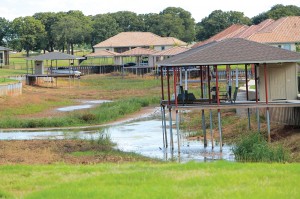For several years people in Granbury have been watching their beloved lake recede from its now-overgrown shoreline. Boats and jet skis that once floated hang on their lifts in the air, and dirt-filled plastic bottles, old tires and even a stolen car litter the new “beaches.”
Sunbaked underbrush fills the dried canals snaking through the Granbury neighborhoods, and retaining walls that once supported upper-middle-class homes crumble without the lake’s support. Underwater places that provided habitat for all sorts of wildlife now roast in the sunlight, and walking across the lake is no longer a miracle.
“What would Venice be without its water canals?” asked Gary Newton, a retired engineer who moved to Granbury in the early ’90s to work at Comanche Peak Nuclear Power Plant less than 15 miles away.
In Granbury, just about everyone has an opinion about where the water has gone. Some people think the nuclear power plant is taking it, while others claim it’s just the drought. Another theory is that it’s the closure of the hydroelectric plant on Possum Kingdom Lake, because, while the plant was operating, the Brazos River Authority had to keep a certain amount of water running past its generators, water that then flowed down to the Brazos to feed Lake Granbury.

A United States Geological Survey crew is trying to figure it out, too. They are studying the Brazos because the river helps recharge the Trinity Aquifer, which underlies Dallas, Fort Worth, Austin, and San Antonio — and that recharge isn’t happening the way it should.
Lake Granbury is one of the three reservoirs managed by the Brazos River Authority, all built to supply water to towns and cities, industries, and farmers and ranchers along the length of the river, from near the Panhandle to the Gulf of Mexico.
Since 2007, drought has been lowering water levels in many of Texas’ 14 rivers and hundred-plus reservoirs. Some are now at record low levels.
“At present the current drought condition is the second worst on record,” said Dr. John Nielsen-Gammon, a Texas state climatologist and Regents Professor at Texas A&M University. He’s been studying the drought for several years. “Normal rainfall has not been enough to fill [lakes and rivers]. More than five inches of rainfall over a large area is needed to produce a significant increase, and it will take several of those [major rainfall events] to restore water to the reservoirs.”
Despite the devastating drought, the river authority is pursuing an application to allow it to take even more water out of the Brazos –– in fact two-thirds again as much as it currently takes. The application to the Texas Commission on Environmental Quality doesn’t explain to whom the water would be sold.
Concerned residents from Possum Kingdom to Lake Granbury have banded together to contest the application, which many people fear would result in further shrinkage of those lakes. The authority also sells water (from Lake Granbury) to Luminant for Squaw Creek Reservoir near Glen Rose, which provides cooling water for the Comanche Peak plant. Water levels at Squaw Creek cannot be reduced because of the need to provide consistent cooling to the plant.
Water wars in Texas are only going to get worse, as the combination of population growth and climate change puts more and more pressure on resources that are fast running out. River authorities are fighting with one another. Small towns are losing both surface water and groundwater to cities, and in some parts of the state, oil and gas drilling is taking significant amounts of water permanently out of the water cycle.
Across the state, activists, officials, industries, waterside residents, and other stakeholders are watching the Brazos case closely. Its outcome could set a precedent for whether other river authorities can claim and sell even more water from their respective rivers.
“Over the last 15 years, the state has changed the law by agency action to eliminate a showing of need — a real beneficial use” as a requirement for handing out such permits, said Rick Lowerre, one of the state’s top environmental attorneys. That change, he said, is “allowing for speculation and banking of water rights. So the Brazos River Authority can ask for the rest of the water in the river and force people who need water to buy from them without regard for impacts on the environment or property values.”
********












